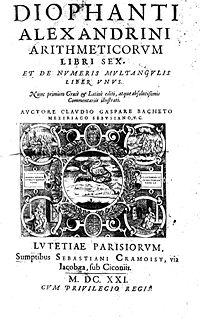
Arithmetica
Encyclopedia

Greek language
Greek is an independent branch of the Indo-European family of languages. Native to the southern Balkans, it has the longest documented history of any Indo-European language, spanning 34 centuries of written records. Its writing system has been the Greek alphabet for the majority of its history;...
text on mathematics
Mathematics
Mathematics is the study of quantity, space, structure, and change. Mathematicians seek out patterns and formulate new conjectures. Mathematicians resolve the truth or falsity of conjectures by mathematical proofs, which are arguments sufficient to convince other mathematicians of their validity...
written by the mathematician
Mathematician
A mathematician is a person whose primary area of study is the field of mathematics. Mathematicians are concerned with quantity, structure, space, and change....
Diophantus
Diophantus
Diophantus of Alexandria , sometimes called "the father of algebra", was an Alexandrian Greek mathematician and the author of a series of books called Arithmetica. These texts deal with solving algebraic equations, many of which are now lost...
in the 3rd century AD. It is a collection of 130 algebra
Algebra
Algebra is the branch of mathematics concerning the study of the rules of operations and relations, and the constructions and concepts arising from them, including terms, polynomials, equations and algebraic structures...
ic problems giving numerical solutions of determinate equations (those with a unique solution) and indeterminate equation
Indeterminate equation
An indeterminate equation, in mathematics, is an equation for which there is an infinite set of solutions; for example, 2x = y is a simple indeterminate equation. Indeterminate equations cannot be directly solved from the given information...
s.
Equations in the book are called Diophantine equation
Diophantine equation
In mathematics, a Diophantine equation is an indeterminate polynomial equation that allows the variables to be integers only. Diophantine problems have fewer equations than unknown variables and involve finding integers that work correctly for all equations...
s. The method for solving these equations is known as Diophantine analysis. Most of the Arithmetica problems lead to quadratic equation
Quadratic equation
In mathematics, a quadratic equation is a univariate polynomial equation of the second degree. A general quadratic equation can be written in the formax^2+bx+c=0,\,...
s. It was these equations which inspired Pierre de Fermat
Pierre de Fermat
Pierre de Fermat was a French lawyer at the Parlement of Toulouse, France, and an amateur mathematician who is given credit for early developments that led to infinitesimal calculus, including his adequality...
to propose Fermat's Last Theorem
Fermat's Last Theorem
In number theory, Fermat's Last Theorem states that no three positive integers a, b, and c can satisfy the equation an + bn = cn for any integer value of n greater than two....
, scrawled in the margins of Fermat's copy of 'Arithmetica', which states that the equation
 , where
, where  ,
,  ,
,  and
and  are non-zero integers, has no solution with
are non-zero integers, has no solution with  greater than 2.
greater than 2.In Book 3, Diophantus solves problems of finding values which make two linear expressions simultaneously into squares or cubes. In book 4, he finds rational powers between given numbers. He also noticed that numbers of the form (
 ) cannot be the sum of two squares. Diophantus also appears to know that every number can be written as the sum of four squares. If he did know this result it would be truly remarkable for even Fermat, who stated the result, failed to provide a proof of it and it was not settled until Joseph Louis Lagrange
) cannot be the sum of two squares. Diophantus also appears to know that every number can be written as the sum of four squares. If he did know this result it would be truly remarkable for even Fermat, who stated the result, failed to provide a proof of it and it was not settled until Joseph Louis LagrangeJoseph Louis Lagrange
Joseph-Louis Lagrange , born Giuseppe Lodovico Lagrangia, was a mathematician and astronomer, who was born in Turin, Piedmont, lived part of his life in Prussia and part in France, making significant contributions to all fields of analysis, to number theory, and to classical and celestial mechanics...
proved it using results due to Leonhard Euler
Leonhard Euler
Leonhard Euler was a pioneering Swiss mathematician and physicist. He made important discoveries in fields as diverse as infinitesimal calculus and graph theory. He also introduced much of the modern mathematical terminology and notation, particularly for mathematical analysis, such as the notion...
.
Arithmetica became known to Muslim mathematicians in the tenth century when Abu'l-Wefa translated it into Arabic.

